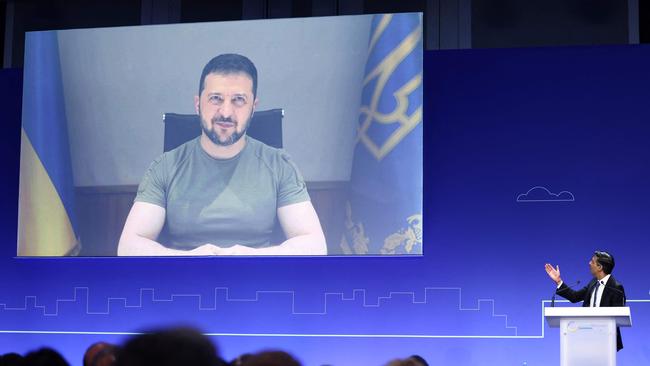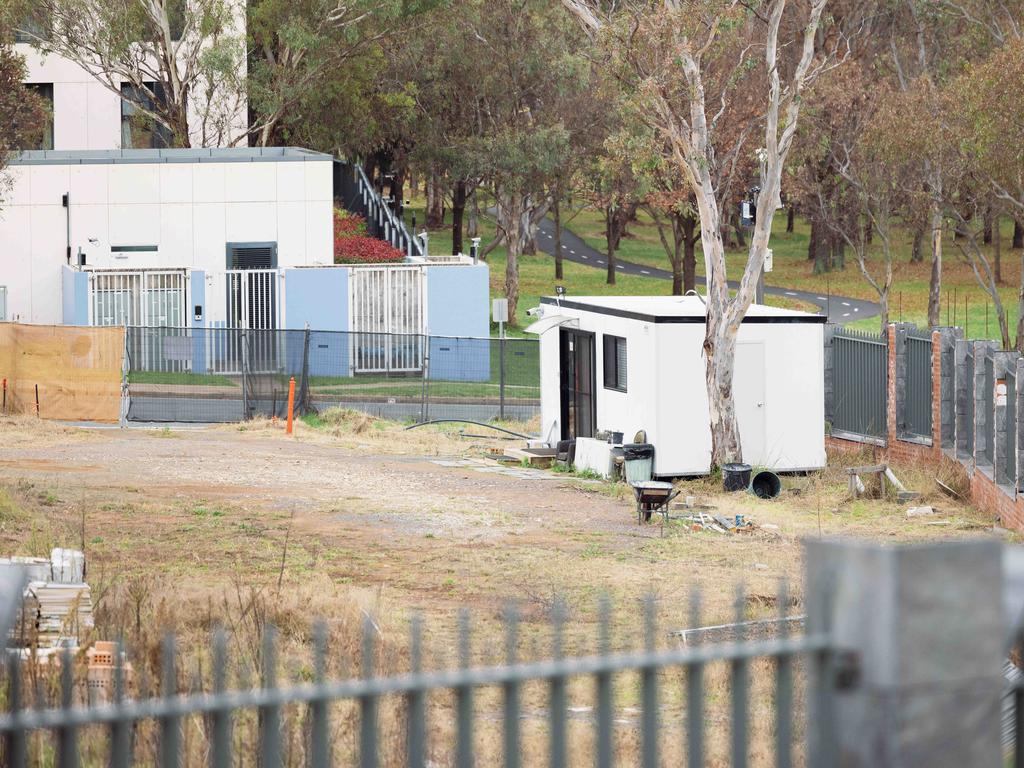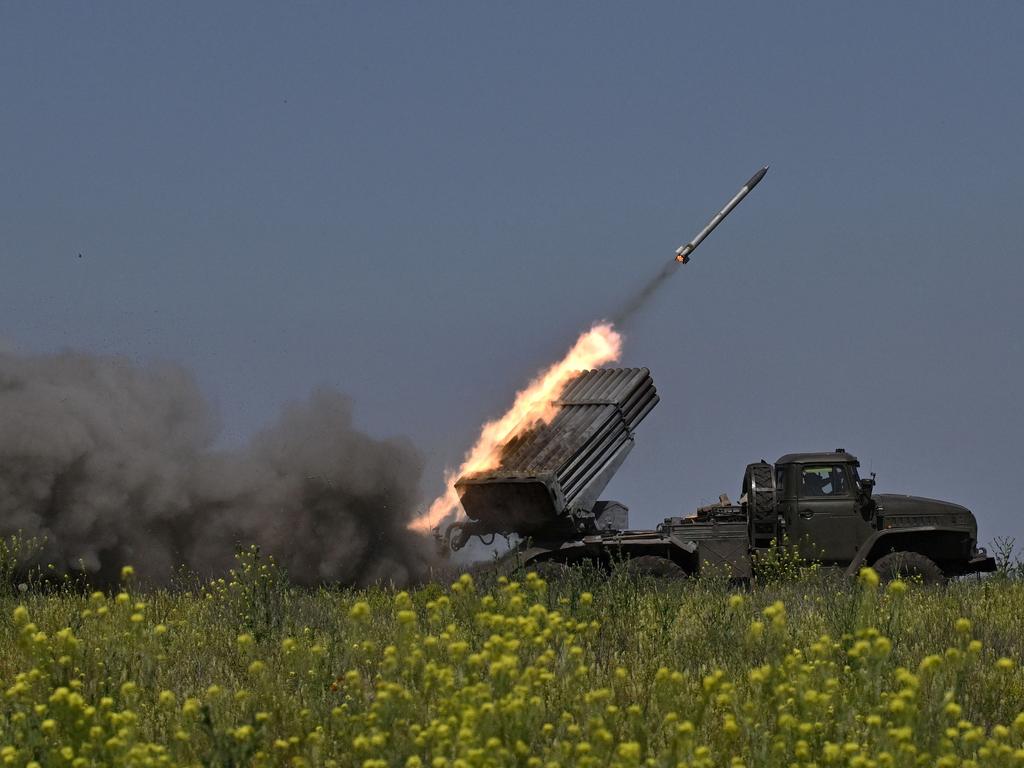Western approach to Russia’s war on Ukraine is delusional
Faced with the inevitability of long-term confrontation with Russia, governments must re-arm urgently because sanctions aren’t hurting the Kremlin.

I don’t know about you, but for some years I have harboured serious doubts that there is a Santa Claus. Yet the biggest European governments represented at this week’s Ukraine donor conference in London, including our own, appear confident that good things get stuffed down chimneys at Christmas by benign old men. For all we know, they also believe the earth is flat.
Their conduct of policy suggests a chasm between rhetoric and action. Many of the pledges made this week are conditional, and the total falls far short of the cash Kyiv needs.
Meanwhile few military analysts, even those most optimistic about the Ukrainian offensive that has just begun, anticipate an early end of the war. Indeed, the Kremlin is pinning its hopes on protracting hostilities until the West grows weary.
The logic of this prospect demands that our governments energise munitions supply chains and reinforce our own defences against possible escalation. We need to think, and act, both swift and long. The Nordic nations and Poland are behaving thus prudently: the latter is positioning itself to become a keystone of European defence. Finland and Sweden are notable for the urgency with which they are re-arming.
The US military is also galvanised. A year or two from now, despite the huge quantities of materiel shipped, thanks to imaginative planning and Congressional support, America’s armed forces will be stronger than they were before the war started.
Western European nations, by contrast, display a lassitude entirely discordant from their words. Germany continues to do almost nothing, France very little. Both are more realistic than they were a year ago about the inevitability of long-term western confrontation with Russia. But they seem bereft of will to adopt the measures consequent upon such a conclusion.
America’s financial and military aid to Ukraine is 15 per cent greater than that of the entire EU. Britain holds the proud title of being second largest donor. But the UK has shipped just one-seventh of the weapons and equipment supplied by the US. Moreover, having embarked on the right course 16 months ago, Britain is now doing almost nothing to replace the huge quantities of equipment stripped from the British Army. Just one contract is close to signature, for BAE Systems to rebuild depleted stocks of 155mm artillery ammunition.
However it will be years – I repeat, years – before these shells can be delivered. Meanwhile, the Treasury seems entirely unwilling to fund additional re-armament, beyond money stolen for Ukraine from the existing defence budget. The latest issue of the authoritative IISS journal carries a devastating analysis of the parlous state of western Europe’s defence industries, including Britain’s.
Since Brexit, the government has announced ambitious strategic commitments to advance “global Britain”, including a presence in the Far East and grandiose RAF responsibilities. But there are no new resources to make these declarations more than verbiage. The prime minister, preoccupied with domestic issues, scarcely pays lip service to defence. Our politicians offer pious expressions of intent about Ukraine and UK defence, which in current circumstances are interwoven, without lifting a finger to give practical effect to their words.
This is not a failure unique to Rishi Sunak’s administration. David Cameron, Theresa May, Boris Johnson and Liz Truss were equally guilty, and I say this mindful of Johnson’s 2021 one-off cash boost to the defence budget. Gesture strategy is a national vice. It has become much less excusable, however, now that thousands are dying on Ukrainian battlefields and from Russia’s aerial terror campaign.
A real possibility exists that Vladimir Putin will some morning turn his malice upon Britain, foremost among his European foes, by deniably attacking our sub-sea infrastructure, for instance, one of many threats against which we are ill-protected.
I am as eager as anyone to see Russia crushed; Ukraine and its western backers triumphant. Where I part company with some hawks is in their willingness to treat aspiration as a substitute for realism. It helps no one to swallow Ukrainian propaganda, of which there is plenty. The respected American-Ukrainian historian Serhii Plokhy published a recent book about the war in which he made several assertions that seem fanciful.
He suggested western sanctions against Moscow were working, when many oligarchs are still making fools of us, with their huge interests, amusements and multiple dependants in Europe. The Russian economy is holding up astonishingly well, because it suits many countries, including big ones like India, to continue buying Putin’s oil.
Plokhy states that Russia has no allies. Yet China and Iran can be deemed little else, and a large part of the world remains determinedly neutral, with some surprising countries, such as South Africa, tilting towards Moscow. Speculation persists that Putin may fall. Perhaps so, but I meet no Kremlinologists who believe that whoever follows him is likely to prove nicer.
We must adapt to a world in which Russia has made a historic shift away from Europe. Putin’s strategy is to render Ukraine a failed state, a threadbare neighbour that he can live with rather than a success story such as he cannot endure. Last year its economy shrank by almost one third, and inflation is running at 27 per cent. The West has an overwhelming interest in saving Ukraine from Russian-imposed beggary, though as Edward Lucas observed on Monday, corruption will make this harder. Moreover, western voters must be told frankly that their enthusiasm for Ukraine must be paid for – that, if we are serious, we must share sacrifices.
Henry Kissinger has changed his long-held view that Ukraine cannot join NATO, and we may need to do likewise. Today, both the US and Germany oppose such a step. But the one certainty about ending this struggle is that Ukraine must be given cast-iron security guarantees. It may not be unthinkable – perhaps after years’ more killing – to trade Ukrainian NATO membership for tolerance of continued Russian tenure of Crimea.
European nations with a sense of self-preservation must strengthen their armed forces and replace every gun and shell sent to Kyiv. The British people must abandon our complacency about what we have done to help President Zelensky’s nation. It is right and it is important, but it is not enough, and years more of the same lie ahead.
Gideon Rose, a notably hawkish fellow of the US Council on Foreign Relations, wrote recently: “It took defeat in two world wars before Germany got the message that aggression didn’t pay. It might take defeat … in a second cold war for Russia to learn the same lesson. Until then, the wall must be guarded.” I hope Rose is too gloomy, but fear he is not.
The Times







To join the conversation, please log in. Don't have an account? Register
Join the conversation, you are commenting as Logout